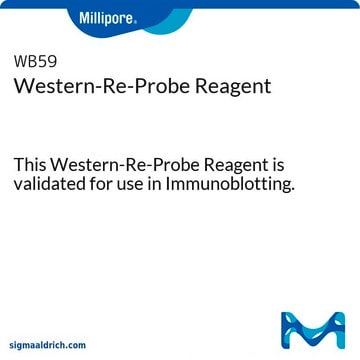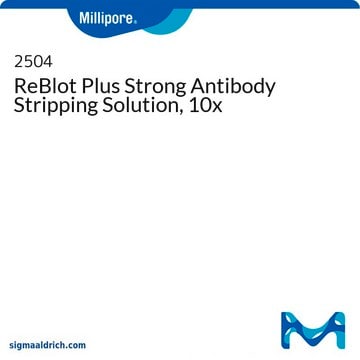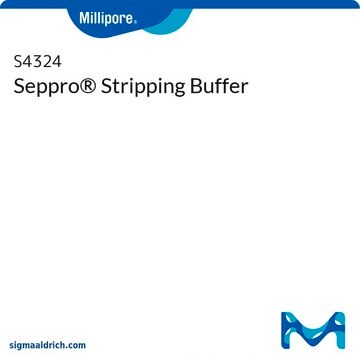2502
ReBlot Plus Mild Antibody Stripping Solution, 10x
Synonyme(s) :
Western blot stripping solution, blot stripping solution
About This Item
Produits recommandés
Forme
liquid
Conditionnement
pkg of 50 mL
Fabricant/nom de marque
Chemicon®
Re-Blot™
Technique(s)
western blot: suitable
Méthode de détection
chemiluminescent
Conditions d'expédition
wet ice
Description générale
Stripping and reprobing of Western blots offers several advantages:
1) Conservation of samples that are expensive or available only in limited quantities,
2) Analysis of a given blot using several different antibodies, e.g. subtype- or isoform-specific antibodies,
3) Reanalysis of anomalous results and confirmation with the same or a different antibody,
4) Correcting errors in incubation with the wrong antibody,
5) Cost savings in reagents and time by reusing the same blot.
While antigen and antibody-based immunoaffinity matrices, such as Sepharose™ conjugates, have been reused many times without compromising antigen-antibody reactivity, the need for pH extremes and chaotropic agents has precluded the application of these methods to Western blotting.
The MILLIPORE Re-Blot Plus Western Blot Mild Antibody Stripping Solution contains specially formulated solutions that quickly and effectively remove antibodies from Western blots without significantly affecting the immobilized proteins.
Advantages of the Re-Blot Plus Western Blot Mild Antibody Stripping Solution include:
- No pungent smelling β-mercaptoethanol is contained in the Antibody Stripping Solution.
- Antibody stripping is done at room temperature. No heating of blots is required.
- Blots can be stripped of antibodies in approximately 15 minutes at room temperature.
- Blots may be reused in 25 minutes.
Application
The Re-Blot Plus Western Blot Mild Antibody Stripping Solution should be used only for qualitative purposes until it has been established by comparative blot analysis that stripping does not quantitatively affect a given antigen.
This product is for research use only; not for diagnostic or in vivo use.
Composants
Stockage et stabilité
Note: To prevent reagent degradation secure the cap tightly upon storage. Avoid extended exposure to air.
Informations légales
Clause de non-responsabilité
Mention d'avertissement
Danger
Mentions de danger
Classification des risques
Acute Tox. 3 Dermal - Acute Tox. 4 Inhalation - Acute Tox. 4 Oral - Aquatic Chronic 2 - Eye Dam. 1 - Met. Corr. 1 - Skin Corr. 1A
Code de la classe de stockage
6.1B - Non-combustible acute toxic Cat. 1 and 2 / very toxic hazardous materials
Classe de danger pour l'eau (WGK)
WGK 2
Point d'éclair (°F)
Not applicable
Point d'éclair (°C)
Not applicable
Certificats d'analyse (COA)
Recherchez un Certificats d'analyse (COA) en saisissant le numéro de lot du produit. Les numéros de lot figurent sur l'étiquette du produit après les mots "Lot" ou "Batch".
Déjà en possession de ce produit ?
Retrouvez la documentation relative aux produits que vous avez récemment achetés dans la Bibliothèque de documents.
Les clients ont également consulté
Notre équipe de scientifiques dispose d'une expérience dans tous les secteurs de la recherche, notamment en sciences de la vie, science des matériaux, synthèse chimique, chromatographie, analyse et dans de nombreux autres domaines..
Contacter notre Service technique













